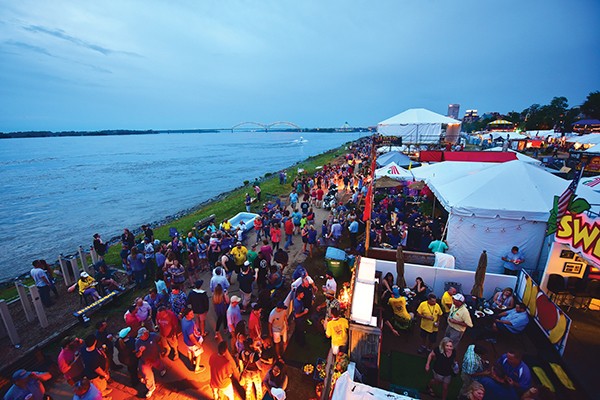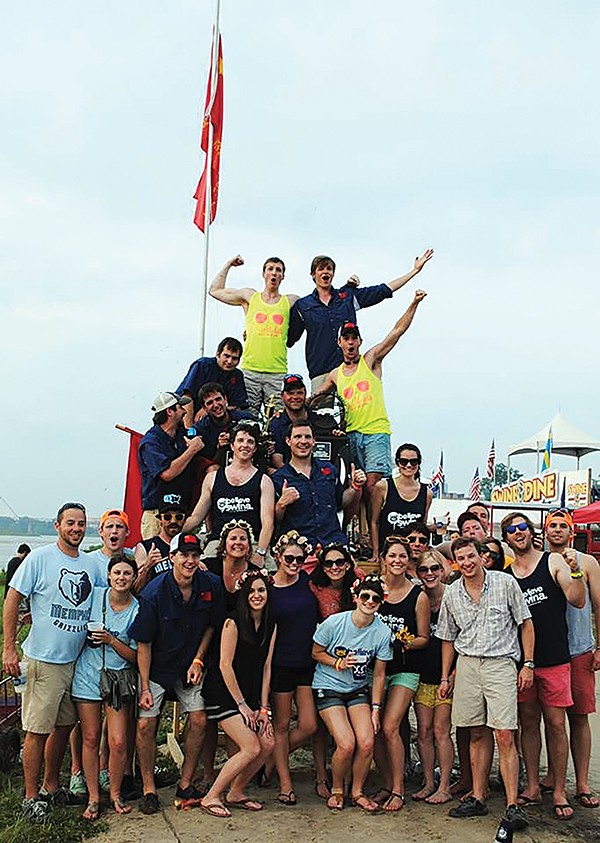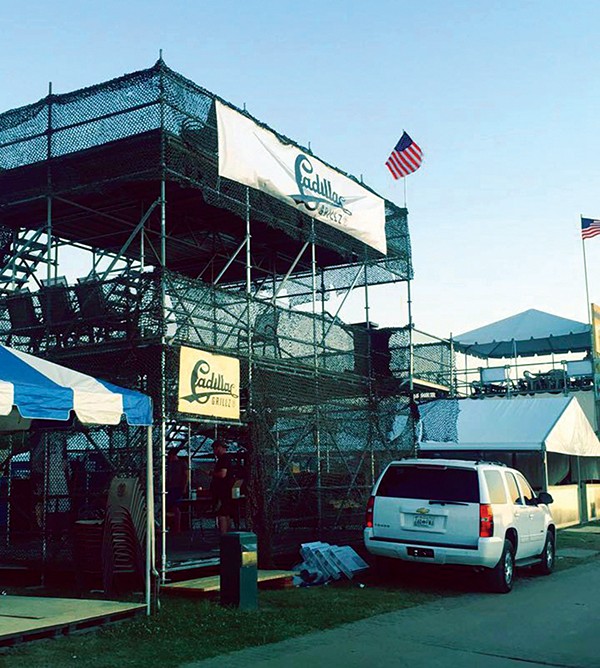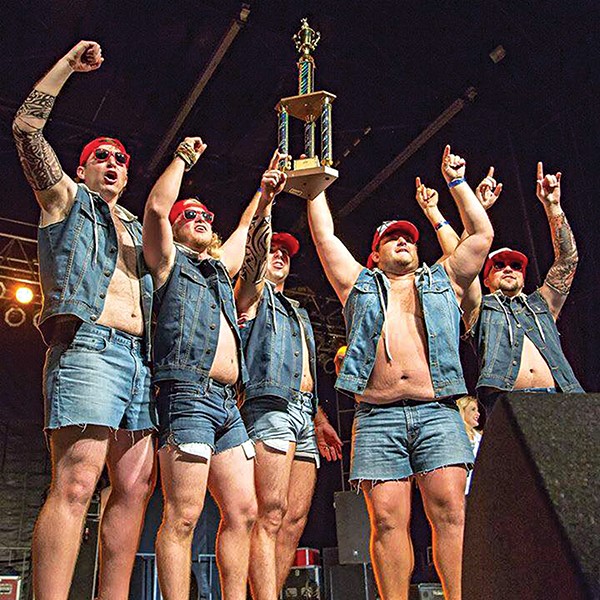Meat is key, but meet and greet also is a big deal to teams participating in the Memphis in May World Championship Barbecue Cooking Contest.
Some teams have perfected the art of partying the way others perfected the art of effectively applying rubs to their slabs.
Teams are serious about their ‘cue, but the riverfront setting and the opportunity to host family, friends, and business clients also make the event “the perfect venue and excuse for a great party,” says Robert Griffin, Memphis in May director of marketing.
This year, 225 teams representing 22 states and four foreign countries will participate in Barbecue Fest.
Here are three veteran teams known for their swine soirees.
 Memphis In May | Andrea Zucker
Memphis In May | Andrea Zucker
PEOPLE’S REPUBLIC OF SWINA
People’s Republic of Swina didn’t exactly make a flashy entrance when the team became part of the Memphis in May World Championship Barbecue Cooking Contest.
“Ten people in a raggedy tent,” says Will Vestal, one of the founding members. “We showed up with a Weber grill, no flooring, and an ice luge.”
That was 10 years ago. Kyle Rogers, who was living Downtown in the Shrine Building, came up with the idea of forming a team. He got some other guys, including Vestal, to go in with him. They figured if they divided up the cost, they could swing it.
Vestal says, “I’m in for a party. I’ve been going to Barbecue Fest for years. I can’t wait to have our own party. We just want to throw a rager down there.”
John Rote came up with the team name — “People’s Republic of Swina,” which was a play on “People’s Republic of China,” Vestal says. Their chairman was “Chairman Sow.” But over the years, the name just became “Swina.”
They were given a site on the south end of Tom Lee Park. Members brought kegs of beer and lawn chairs. “Our head chef, who was supposed to stay up with the grill smoking the meat, passed out.”
Their ranking that year? “I think we got last place. I don’t know if we had raw meat. I don’t know what we served that year.”
Their tent consisted of “just a boom box” and a bunch of guys “drinking beers and taking shots and hanging out.”
The next year was different. “We built our own flooring, built a bar, built a DJ booth, and got access to a more real-deal smoker. And each time the party got a little bigger and a little bigger. More full-time members, their friends, and everybody started showing up.”

Republic of Swina
Each year, Swina had a theme. One year they were “Swina Island,” Vestal says. “We built that 12-foot-tall lifeguard stand and poured sand all over the walkway in front of us. A huge kiddie pool. Filled that up.”
Swina also became known for its beer pong table. “People come from other teams, walk by and see it, and challenge people to play. The line got longer and longer,” Vestal recalls. “When you come and play, you have to put your ID down — your physical driver’s license on the table — and that holds your spot. Many times on Sunday we’ve found people’s drivers licenses, passports, business cards because they got too drunk.”
They also play the “cracker game.” Members write their name on a saltine cracker with a felt pen. They throw the crackers on the sidewalk in front of the tent. They then sit in lawn chairs and watch people pass by. “Somebody steps on your cracker, you’re out. But the last one standing has to eat their cracker off the ground. Really, you don’t want to win.”
So, what about the barbecue? “We party, but at some point, we decided we also have to cook some barbecue. The party is important. We’re No. 1 in party. But we also want to be No. 1 in barbecue,” Vestal says. “The guys that are always winning cook good barbecue, but they don’t throw a good party. Nobody is raging in Big Bob Gibson’s tent. But they cook great barbecue.”
Swina got serious in 2011 — the year the festival moved to Tiger Lane because the Mississippi River flooded Tom Lee Park. Big Bob Gibson was Swina’s next door neighbor. “We were still having a great party, but our cooker got to talking to Big Bob Gibson, who was giving him pointers on how to do stuff.”
Two Swina team members attended the awards ceremony that year “because they didn’t have anything to do. We got 10th place. We got a trophy. They came back to the tent Saturday afternoon, ‘We placed!’ Everybody was going nuts. ‘How did we manage that?'”
The next year, Swina partied hard. “Friday night, we’re throwing this huge rager, and it goes 24 hours because everybody’s got 24-hour wristbands, hanging out all night. Next morning, we’re down there cleaning ourselves up, combing our hair, making us look good.”
This time, 50 members go to the ceremony and discover Swina came in second place.
“We’re going to come in first at some point,” Vestal says. “And, honestly, this is our 10-year anniversary. Everybody is coming back. We’re going to rage, but we’re going to cook some awesome barbecue. We’re going to make this the year. First place in shoulder and first place in party.”
CADILLAC GRILLZ
A lot of anxious faces can be seen in front of the Cadillac Grillz barbecue booth during the Memphis in May World Championship Barbecue Cooking Contest.
People, who are hoping they can get in, are longingly looking up at the triple-decker structure, which is jam-packed with partiers. Music blares. People are laughing and trying to talk over the music.
But there are only so many wristbands to give out.
“It’s friends and family first,” says Jack Wohrman, one of the founding members. “And outside of that, acquaintances end up coming through.”
Cadillac Grillz, which celebrates its 10th anniversary this year, has a few signature things it’s known for: DJ Tree, who keeps the music going (the late Robert Raiford also deejayed for the Cadillac Grillz); bikini-clad bartenders, who keep the drinks flowing; and team members who are big-time Memphis Grizzlies boosters.
“Around a decade ago, several of us, who had been on another team in the past or various teams, decided to put this one together, and it took off quickly,” Wohrman says. “We had a good party event to kick it off well, and it just continued to snowball from there and turn into a bigger and bigger event.”
The name came from the lyrics of a Ludacris song, Wohrman says. “I guess just one of those goofy things somebody threw out.”
The team members wore camouflage tank tops and polo shirts. “At the time we kicked it off, it was kind of a little different from what everybody else was doing. We wanted to be our own crew, and it was just what worked for us.”
The women bartenders wear camouflage bikinis. “We get them made for them with the Cadillac Grillz logo on them.”

Cadillac Grillz
Explaining the Grizzlies connection, Wohrman says, “Typically, when the Grizzlies were winning, the playoffs were right around Barbecue Fest time. So, we would always get a TV and set it up and be able to watch the Grizzlies games. If it was a home game, a handful of us would go to the game, but there would be a big contingent watching the game.”
Grizzlies fans from other tents would show up to watch the games on TV at the Cadillac Grillz booth. “So, next thing you know, we’ve got 300 people jumping up and down pulling for the Griz in our tent. And it was just a blast.”
“It became a great atmosphere for Memphians and people who were in from out of town,” says team member Clark Schifani. “They could feel what it was like to be a part of that Memphis culture.”
Grizzlies players visited the tent. “I remember Quincy Poindexter being in there,” Wohrman says. “I guess those would typically be in off years when we weren’t in the playoffs. When playoffs were active, players were resting up.”
Original members still are involved, but a younger group of Cadillac Grillz members have become involved with the team.
The original members “make sure we follow the template. We do all the busy work to make sure it all goes off without a hitch,” Schifani says.
Cadillac Grillz members are serious about the barbecue cooking aspect of the event, Wohrman says. “We have always participated in the competition. And many team members take part in trying to make sure we have a good product. Others were focused more on the party. We came in fourth in the world in ribs in 2011. So, we got to get up on stage and get a trophy.”
They’ve cooked ribs in the past, but this year they’re moving to shoulders. Chris Lafloy, who is known in barbecue circles, joined the Cadillac Grillz team and is going to cook this year, Wohrman says. “I think we’re going to come out with a bang on the cooking side this year.”
This year, the Cadillac Grillz booth is is moving “a little further South,” he says. “That has to do with shifting over to the shoulder competition.”
So, is the Cadillac Grillz triple-decker booth the tallest structure at Barbecue Fest? “It’s up there,” Wohrman says. “I don’t know if it’s the tallest, but if I was a betting man, I would bet nobody’s taller.”
CHI-TOWN COOKERS
Describing Chi-Town Cookers, David Scully says, “It’s been a party team from the very beginning.”
But, he says, “It’s not necessarily all about parties.”
His parents and their friends, most of whom went to Christian Brothers University, decided to form a team when the Memphis in May World Championship Barbecue Cooking Contest was just a couple of years old.
They sent in an application, but they were rejected. “They believed Memphis in May at the time wanted the competition to be national. Even international. So, the next year they mailed the application to my grandma in Chicago. They named the team the ‘Chi-Town Cookers.'”
His grandmother mailed the application from Chicago, so the postmark would be “Chicago.” A lot of the college kids really were from Chicago, Scully says.
They got in.
His parents and their friends kept the team going for about 20 years, but when their children became juniors and seniors in high school, they stopped doing Chi-Town Cookers.
About seven years later, the team was reborn. “By this time, enough of the second generation was 21, and we thought we could reboot it.”

Chi-Town Cookers
They decorated the front of their tent to look like Wrigley Field. They told people, “We’re a party team and not much of a cooking team. We do cook. Try this test run, and if you feel like you need to spit it out, we’ll refer you to the Pronto Pup stand.”
As they do now, the team members took the “Ms. Piggy Idol” contest seriously. This is when teams compete against other teams in music performances on stage in Tom Lee Park. “Our parents — the first generation — were world champs of showmanship. We won Ms. Piggy Idol three out of the last four years.”
The Chi-Town Cookers tent gets crowded. “We serve dinner. We try to do it around 6:30, 7. As it gets later in the evening, the sun goes down, music gets louder, tables and chairs go to the side.”
The barbecue? “Extremely secondary,” Scully says.
He recalls the time a judge visited the tent. “We take the shoulder, set it out. Maybe it’s a little dirtier than it should be. We’re a little dirtier than we should be.”
The judge begins examining the shoulder. ‘He says, ‘Can you remove the shank bone for me?'”
Scully looks at the guy next to him. “What the fuck is a shank bone?”
“The first year in shoulder, we finished second to last. The only team that we beat was disqualified because they stole some trophies from one of the other teams.”
One year, Chi-Town Cookers ranked in the top 10, Scully says. But usually, he says, “Every year on Saturday, we wait around as if we’re going to be selected in the top 10. When the semi-finals are going to be posted, someone will run down there and find out our score and come back to the tent. When they get back, the party is in full swing — people partying, dancing, doing keg stands. The person jumps on top of the bar and says, ‘I want to congratulate you because you have just cooked the 67th best ribs in the world.’ And we celebrate. We start spraying beers around like in the NBA locker room when they make the playoffs or a conference championship.”